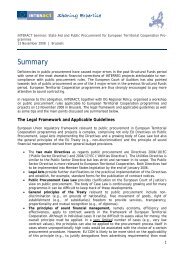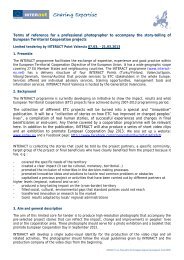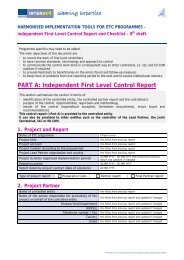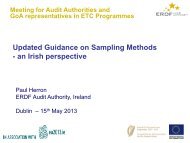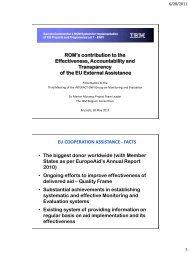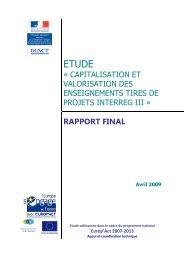VADEMECUM COMMUNITY RULES ON STATE AID - Interact
VADEMECUM COMMUNITY RULES ON STATE AID - Interact
VADEMECUM COMMUNITY RULES ON STATE AID - Interact
Create successful ePaper yourself
Turn your PDF publications into a flip-book with our unique Google optimized e-Paper software.
(iii) compensation does not exceed the net costs of providing the service plus a<br />
reasonable profit (i.e. no over-compensation); and<br />
(iv) the compensation is determined either through public procurement or if no public<br />
tender has taken place, the company entrusted with the SGEI is compensated on the<br />
basis of the costs of a typical well-run company.<br />
Measures<br />
1. Decision<br />
The Decision specifies the conditions under which compensation to companies for the<br />
provision of SGEI is compatible with state aid rules and does not have to be notified to the<br />
Commission in advance.<br />
Conditions:<br />
• a clearly defined public service mandate;<br />
• no over-compensation;<br />
• compensation of less than €30 million per year per undertaking; and<br />
• annual turnover of less than €100 million per undertaking.<br />
• no limits for amount of compensation: - hospitals;<br />
- social housing;<br />
- air and sea transport to islands;<br />
- airports and ports below specific<br />
thresholds defined in passenger volumes.<br />
2. Framework<br />
The Framework specifies the conditions under which compensation not covered by the<br />
Decision is compatible with state aid rules. Such compensation will have to be notified to the<br />
Commission due to the higher risk of distortion of competition.<br />
The rules are designed to ensure that there is no overcompensation (compensation that<br />
exceeds the net costs of the public service) and no cross-subsidizing (compensation that is<br />
used on other markets open to competition) as such circumstances could not be found<br />
compatible with the Treaty.<br />
3. Transparency Directive<br />
The Transparency Directive clarifies that companies receiving compensation and operating on<br />
both public service and other markets must have separate accounts for their different<br />
activities, so that the absence of over-compensation can be established.<br />
42



